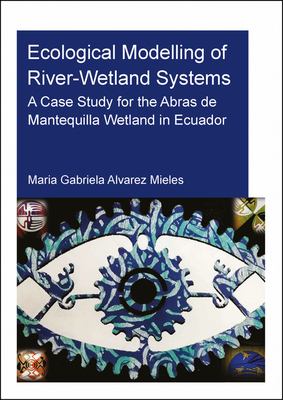Ecological Modelling of River-Wetland Systems: A Case Study for the Abras de Mantequilla Wetland in Ecuador
暫譯: 河流-濕地系統的生態模型:厄瓜多爾曼特基拉濕地案例研究
Alvarez Mieles, Maria Gabriela
- 出版商: CRC
- 出版日期: 2019-06-27
- 售價: $5,270
- 貴賓價: 9.5 折 $5,006
- 語言: 英文
- 頁數: 324
- 裝訂: Quality Paper - also called trade paper
- ISBN: 0367344505
- ISBN-13: 9780367344504
-
相關分類:
地理資訊系統 Gis
海外代購書籍(需單獨結帳)
相關主題
商品描述
Around 6% of the Earth's land surface is covered by wetlands. Wetlands play a key role in hydrological and biogeochemical cycles, delivering multiple benefits to society: sources of water supply, flood regulation, water purification, agriculture, fisheries, and biodiversity. Hence, wetland systems are of immense socio-economic as well as ecological importance. In this research, the focus was on the Abras de Mantequilla (AdM) wetland in the tropical coastal region of Ecuador, a RAMSAR site and case study area for the EU-FP7 WETwin project.
The research in this thesis involves a combination of field data collection, multivariate analysis techniques, as well as numerical modelling studies. The goal was to explore the effects of changes in hydrological forcing on the hydrodynamic and ecohydraulic responses of the wetland. The study aims to contribute to the understanding of how a tropical river-wetland system functions in terms of hydrodynamics, water quality, primary production, and biotic communities. Spatial patterns of biotic communities and environmental variables are obtained as well as spatio-temporal variability of hydrodynamics, water quality, primary productivity and fish habitat-suitability conditions.
In data scarce areas and countries with financial constraints, the combination of field measurements with numerical models was extremely useful and relevant, confirming that these techniques complement each other in obtaining a better understanding of the dynamics of freshwater river-wetland systems. Studies like the present research can be used to enhance awareness about the environmental services of wetlands and stimulate cooperation between all stakeholders in order to achieve more sustainable wetland management.
商品描述(中文翻譯)
約有6%的地球陸地表面被濕地覆蓋。濕地在水文和生物地球化學循環中扮演著關鍵角色,為社會提供多重好處:水源供應、洪水調節、水質淨化、農業、漁業和生物多樣性。因此,濕地系統在社會經濟和生態上具有極大的重要性。本研究的重點是厄瓜多爾熱帶沿海地區的Abras de Mantequilla (AdM) 濕地,該地點為RAMSAR地點,也是EU-FP7 WETwin項目的案例研究區域。
本論文的研究涉及現場數據收集、多變量分析技術以及數值建模研究。目標是探討水文強迫變化對濕地的水動力學和生態水力學反應的影響。該研究旨在增進對熱帶河流-濕地系統在水動力學、水質、初級生產和生物群落方面運作的理解。獲得生物群落和環境變數的空間模式,以及水動力學、水質、初級生產力和魚類棲息地適宜條件的時空變異性。
在數據稀缺的地區和財政受限的國家,現場測量與數值模型的結合極為有用且相關,證實這些技術在獲得對淡水河流-濕地系統動態的更好理解方面是互補的。像本研究這樣的研究可以用來提高對濕地環境服務的認識,並促進所有利益相關者之間的合作,以實現更可持續的濕地管理。
作者簡介
Maria Gabriela Alvarez Mieles was born in Guayaquil, Ecuador. She has a Bachelor degree in Biology from the Natural Sciences Faculty at Universidad de Guayaquil, with honours 'Accesit al Contenta' equivalent to magna cum laude. During her early career, she has worked at the Aquatic Pollution department of a National Research Institute in Ecuador (Instituto Nacional de Pesca - INP), participating in monitoring campaigns in some of the main rivers, sea, and estuaries in protected areas. Later she joined Efficacitas, an environmental consultancy office where she participated in several environmental impact assessments, audits and monitoring campaigns for different productive sectors of Ecuador (water, electric, hydrocarbons, mining and industry).
She pursued the MSc in Environmental Sciences at UNESCO-IHE, specialization Planning and Management, with a fellowship from the World Bank (2007). Her MSc thesis was about "Ecological Indicators-A tool for assessment the present state of a river. A pre-impoundment study in Quevedo-River, Ecuador". IN 2007, she received an internship at DELTARES, in the Marine and Coastal Department for one of the R&D projects on 'Building with Nature'. In 2008, she was engaged at UNESCO-IHE, first contributing to the EU funded research project based on Lake Maryut (Egypt). In 2009, she had the opportunity to join the WETwin project (EU funded), as a researcher for the Ecuadorian case study (on a wetland in the Guayas River Basin). The project focus aimed to enhance the role of wetlands in integrated water resource management. Her involvement in this project motivated her to pursue a PhD in order to enhance the research for the Abras de Mantequilla wetland.
She developed her PhD research at UNESCO-IHE, Department of Water Sciences & Engineering, with a fellowship from the Dutch Ministry of Foreign affairs (Netherland fellowship programme NFP-NUFFIC), and financial support from the WETwin project for her fieldwork campaigns. Her PhD thesis was on environmental monitoring and modelling of the 'Abras de Mantequilla' wetland (RAMSAR site 2000) in Ecuador, applying analytical metrics and ecological modelling to enhance the understanding of tropical wetland systems.
作者簡介(中文翻譯)
瑪麗亞·加布里埃拉·阿爾瓦雷斯·米耶萊斯出生於厄瓜多爾的瓜亞基爾。她擁有厄瓜多爾瓜亞基爾大學自然科學學院的生物學學士學位,並獲得「Accesit al Contenta」榮譽,相當於優等榮譽(magna cum laude)。在她的早期職業生涯中,她曾在厄瓜多爾國家研究所的水體污染部門(Instituto Nacional de Pesca - INP)工作,參與了對一些主要河流、海洋和保護區內河口的監測活動。之後,她加入了Efficacitas,一家環境顧問公司,參與了厄瓜多爾不同生產部門(如水、電力、碳氫化合物、礦業和工業)的多項環境影響評估、審計和監測活動。
她在UNESCO-IHE攻讀環境科學碩士學位,專攻規劃與管理,並獲得了世界銀行的獎學金(2007年)。她的碩士論文題目為「生態指標—評估河流現狀的工具。厄瓜多爾奎維多河的預先蓄水研究」。在2007年,她獲得了DELTARES的實習機會,進入海洋與沿海部門參與「與自然共建」的研發項目。2008年,她在UNESCO-IHE工作,最初參與了基於瑪里尤特湖(埃及)的歐盟資助研究項目。2009年,她有機會加入WETwin項目(歐盟資助),擔任厄瓜多爾案例研究的研究員(針對瓜亞斯河流域的一個濕地)。該項目的重點是增強濕地在綜合水資源管理中的作用。她在此項目中的參與激勵她追求博士學位,以增強對阿布拉斯·德·曼特基拉濕地的研究。
她在UNESCO-IHE的水科學與工程系進行博士研究,獲得荷蘭外交部的獎學金(荷蘭獎學金計劃 NFP-NUFFIC),並獲得WETwin項目的財務支持以進行實地調查。她的博士論文專注於厄瓜多爾「阿布拉斯·德·曼特基拉」濕地(RAMSAR地點2000)的環境監測與建模,應用分析指標和生態建模來增進對熱帶濕地系統的理解。































